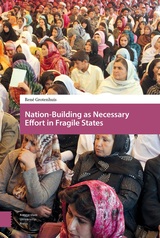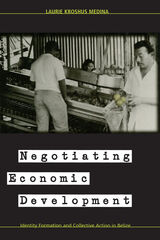158 books about Group identity and 3
start with N
158 books about Group identity and 3
158 books about Group identity
3 start with N start with N
3 start with N start with N

Nation-Building as Necessary Effort in Fragile States
René Grotenhuis
Amsterdam University Press, 2016
Policies intended to bring stability to fragile states tend to focus almost exclusively on building institutions and systems to get governance right. Simply building the state is often seen as sufficient for making it stable and legitimate. But policies like these, René Grotenhuis shows in this book, ignore the question of what makes people belong to a nation-state, arguing that issues of identity, culture, and religion are crucial to creating the sense of belonging and social cohesion that a stable nation-state requires.
[more]

Navigating the Future
Social Identity, Coping, and Life Tasks
Geraldine Downey
Russell Sage Foundation, 2005
Psychologists now understand that identity is not fixed, but fluid and highly dependent on environment. In times of stress, conflict, or change, people often adapt by presenting themselves in different ways and emphasizing different social affiliations. With changing demographics creating more complex social groupings, it is important to understand the costs and benefits of the way social groups are categorized, and the way individuals understand, cope with, and employ their varied social identities. Navigating the Future, edited by Geraldine Downey, Jacquelynne Eccles, and Celina Chatman, answers that call with a wealth of empirical data and expert analysis. Navigating the Future focuses on the roles that social identities play in stressful, challenging, and transitional situations. Jason Lawrence, Jennifer Crocker, and Carol Dweck show how the prospect of being negatively stereotyped can affect the educational success of girls and African Americans, making them more cynical about school and less likely to seek help. The authors argue that these issues can be mitigated by challenging these students educationally, expressing optimism in their abilities, and emphasizing that intelligence is not fixed, but can be developed. The book also looks at the ways in which people employ social identity to their advantage. J. Nicole Shelton and her co-authors use extensive research on adolescents and college students to argue that individuals with strong, positive connections to their ethnic group exhibit greater well-being and are better able to cope with the negative impact of discrimination. Navigating the Future also discusses how the importance and value of social identity depends on context. LaRue Allen, Yael Bat-Chava, J. Lawrence Aber, and Edward Seidman find that the emotional benefit of racial pride for black adolescents is higher in predominantly black neighborhoods than in racially mixed environments. Because most people identify with more than one group, they must grapple with varied social identities, using them to make connections with others, overcome adversity, and understand themselves. Navigating the Future brings together leading researchers in social psychology to understand the complexities of identity in a diverse social world.
[more]

Negotiating Economic Development
Identity Formation and Collective Action in Belize
Laurie Kroshus Medina
University of Arizona Press, 2004
The citrus industry in Belize could be said to exist primarily to satisfy the needs of people in other countries. A business that is highly dependent on global markets and the geopolitics of international trade, it comprises some 500 farmers, many hundreds of wage laborers, and two processing companies that produce frozen juice concentrate for export. This new study examines how those farmers, laborers, and companies define and pursue shared interests, and how they respond differently to the impact of national development strategies and global economic and political forces. Laurie Kroshus Medina analyzes the development of the citrus industry in Belize over fifteen years to explore the relationship between the production of collective identities and the negotiation of development policies at the interface of global and local processes. She shows how citrus farmers and workers, processing companies, and politicians compete to construct shared identities, how they mobilize collective actors, and how their collective action shapes the goals, policies, and practices associated with development. Taking an ethnographic approach, Medina describes how the Belizean citrus industry responds to cycles of boom and bust, and the implications of such cycles for workers and growers. She offers a close look at the major actors—workers, union members, small and large growers, and politicians—as they respond to global changes in the citrus industry. Her analysis is made more compelling through an account of two open struggles in the industry over the formation of a rival union and the attempt to buy the processing company, owned by the multinational corporation Nestlé. She also includes a discussion of the impact of NAFTA on the industry. Medina's research demonstrates how collective agency in Belize has pushed the citrus industry's development in directions that simultaneously conform to and diverge from the trajectories laid out by foreign agencies. Negotiating Economic Development provides a bridge from old to new studies of Latin American social movements as it offers key insights into competing forms of identity for a wide range of social scientists concerned with the human and social aspects of development issues and globalization.
[more]
READERS
Browse our collection.
PUBLISHERS
See BiblioVault's publisher services.
STUDENT SERVICES
Files for college accessibility offices.
UChicago Accessibility Resources
home | accessibility | search | about | contact us
BiblioVault ® 2001 - 2024
The University of Chicago Press









